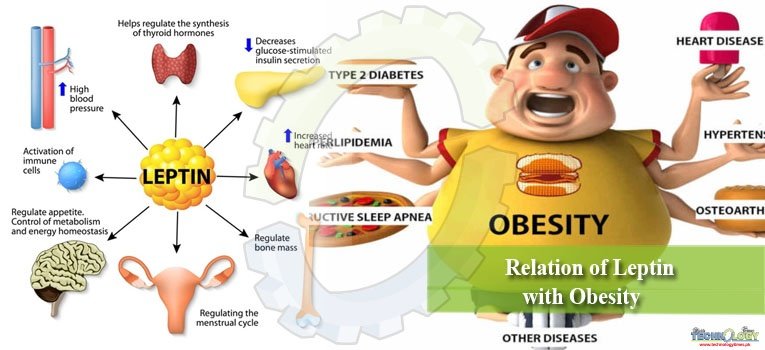The main role of leptin is to maintain and conserve energy in the body. The amount of plasma leptin concentration is directly proportional to the amount of obesity in the body . The ups and downs of leptin are regulated by various hormones in the body.

The up-regulation of leptin is done by insulin and down-regulation by catecholamines. Tumor necrosis factor-α also increases the secretion of leptin. Triglycerides accumulate in the adipocytes due to which they increase in size and in turn synthesize more leptin. The main control center is hypothalamus.
Adipocytes are the fat cells that secrete leptin. Resistance to leptin or its complete deficiency causes life-threatening obesity. With the increase in leptin levels, the adiposity also increases and it induces negative feedback to the center of the brain that is involved in controlling the energy homeostasis. Leptin deficiency is not associated with obesity, instead, the high levels of leptin lead to obesity.
In the case of fasting or weight loss the leptin levels fall down and it leads to changes in hormone levels and energy levels. When there are low leptin levels it signals for overfeeding, inhibits the release of reproductive and thyroid hormones and lessens the immunity.
Statistical Analysis.
Plasma leptin concentrations were measured in 204 obese and normal weight subjects aged 18-80 years. The patients were having no medical and surgical illness. The concentrations were measured by using RIA and full length human recombinant leptin as a standard. The fasting levels observed were between 1.2-97.9 ng/ml.
The statistical results showed that there was a high correlation between plasma leptin concentration and percent body fat (r = 0.710; P<0.0001). The leptin concentration was 3 times higher in women as compared to men. In 5 obese subjects, plasma leptin was reduced by 26% who consumed 1000 calories diet for 10 days (P=0.004). This shows that there is a link between increasing adiposity and continuous rise in circulating leptin .
Leptin deficiency.
The gene that encodes for obesity is the ob gene. Leptin deficiency is caused by a mis-sense mutation in the ob gene and it causes severe obesity . There is low dose leptin anorexigenic agents that are useful in the treatment of human obesity. As a result of reduced circulating leptin, there is a decrease in energy expenditure and hunger is increased .
In the general population, the partial leptin deficiency is not rare . Leptin deficiency is linked with low numbers of T cells and irregular T cell proliferation. These defects can be altered by leptin therapy .For energy homeostasis in mammals including mice and humans, the adipocyte-derived hormone leptin is very important.
Pathway and Receptors invloved in Leptin activity.
Leptin signaling is associated with the JAK-STAT Pathway. The release of Neuropeptide Y is the component of the pathway and it increases during fasting. If any of the components of the leptin signaling pathway are missing then this signals for less food intake. The expression of the leptin gene is associated with a signaling pathway.
The activity of leptins is also associated with its receptor. The binding receptor is known as leptin receptor (LEPR), a cytokine receptor. It has six different isoforms which are formed as a result of alternative splicing. LEPR is important for leptin signaling. A mutation in the leptin receptor alters LEPR signaling which results in obesity. All the above data shows link between leptin and obesity.